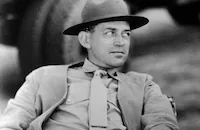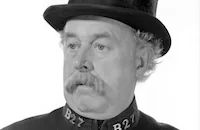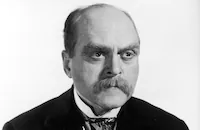Cairo

Brief Synopsis
Cast & Crew
Maj. W. S. Van Dyke Ii
Jeanette Macdonald
Robert Young
Ethel Waters
Reginald Owen
Grant Mitchell
Film Details
Technical Specs

Synopsis
After being dragged from his eighth viewing of movie star Marcia Warren's last American picture, Homer Smith, star reporter for the Cavity Rock Times Leader , hears the news that his Northern California paper has been selected as the best small town newspaper in America. As a reward for the paper, Homer is sent to North Africa to write a series of syndicated articles entitled "The Small Town Looks at the War." When his ship is torpedoed in the Mediterranean, Homer finds himself adrift on a raft and pulls on board fellow passenger Philo Cobson. After they get ashore, Cobson, who is actually a Nazi spy, gives Homer his pipe and tells him that he is a member of British Intelligence. He then asks Homer to go to the Viceroy hotel in Cairo, find a Mrs. Morrison and give her a coded message. In Cairo, Homer locates the suspicious Mrs. Morrison, and tells her that he is working on a story to uncover the female leader of a spy ring known as "The Big Six." She then indicates to him that Marcia, who is performing at the hotel, is the leader. Although Homer is at first skeptical, after seeing Marcia convey an apparently coded message to her maid, Cleona Jones, using hand signals, he assumes that Mrs. Morrison's story is true. The next day, Homer applies for a job as her butler, using the name "Juniper Jones." Marcia knows that he is lying, but thinks that he is simply a down-on-his luck American and hires him, then immediately starts to argue over whether San Francisco or Beverly Hills is the best city in California. The next day, Homer secretly follows Marcia into an antique shop, and when she screams after seeing a mouse, rendering a perfect high C, a secret panel opens, observed only by Homer. Later, Mrs. Morrison, who herself is a Nazi spy, goes behind the panel and confers with her cohorts about a new radio-operated plane that is to crash into a transport carrying British troops through the Suez Canal. As the days pass, Homer and Marcia each becomes suspicious that the other is a spy, even though they are falling in love. One afternoon, he misunderstands a phone call Marcia makes to her dressmaker, Mme. Laruga, and determines to get her out of the house that night so he can search for the "prints" that were to be delivered. Before Marcia leaves, though, Colonel Woodhue of British Intelligence, who has come to believe that Homer is actually Cobson, arrives at her suite and asks her to search Homer's quarters. Although she has suspected that "Juniper" was a phony name, Marcia has difficulty believing that he is really Cobson. After Woodhue leaves, Marcia insists on going out with both Cleo and Homer. At a movie theater, each sneaks out on the other and heads back for the hotel. While Cleo and Marcia search Homer's room and discover his real identity card, which Marcia thinks is a fake, Homer searches Marcia's room, but finds only fan letters. When they both wind up in the darkened living room, Marcia draws a gun on Homer, and after each accuses the other of being a spy, Marcia quizzes Homer on his knowledge of California. After she concludes that he is not a spy after all, he discovers that the "prints" were just material for dresses. The next night, at a concert in the desert, Marcia sings, while Homer follows the antique store owner. When Marcia goes to a pre-arranged trysting place, but discovers only Homer's pipe, she goes home furious. Meanwhile, Homer overhears the antique shop owner talking with the spies, who are going to "the pyramid." As they drive off, Homer hangs on to the running board, then throws away bits of the program for Marcia's concert, alerting one of Woodhue's men. After Marcia accidentally breaks the pipe and finds Cobson's picture and identity card, she realizes that Homer has been telling the truth and is now in great danger. At the pyramid, the Nazis find Homer and are about to take him inside the edifice, which they open with a tuning fork, when he escapes to a plane, unaware that it is the radio plane. Soon Marcia and British Intelligence arrive at the now closed pyramid, not knowing where the Nazis are. When Cleo and her new boyfriend Hector show Marcia some hundred dollar bills, which Hector calls "C-notes," Marcia realizes that Homer was leaving a clue. After a few false notes, Marcia finally sings a perfect High C, the pyramid opens and the Nazis are captured. As the radio plane approaches the troop ship, British planes shoot it down and Homer safely parachutes to safety. Some time later, Homer and Marcia receive a telegram from his boss, who says that he has become the most famous newsman in America, and suggests that he co-star with his wife in a picture. Homer is unsure, until Marcia shows him how they will act, kissing in a closeup.

Director

Maj. W. S. Van Dyke Ii
Cast

Jeanette Macdonald

Robert Young

Ethel Waters

Reginald Owen

Grant Mitchell

Lionel Atwill

Edward Ciannelli
Mitchell Lewis

Dooley Wilson
Larry Nunn
Dennis Hoey

Mona Barrie

Rhys Williams

Cecil Cunningham
Harry Worth
Frank Richards
Bert Roach
Jack Daley
Demetris Emanuel
Jay Novello
Pat O'malley
Selmer Jackson
Jacqueline Dalya
Dan Seymour
Lorin Raker
Alan Schute
Guy Kingsford
William Tannen
Michael Butler

Sidney Melton

James Davis
Lee Murray
Cecil Stewart
Buck Woods
Louise Bates
Kanza Omar
Petra Silva
Ray Cooper
Jack Vlaskin
The Guardsmen
Crew
Basil Adlam
Harold Arlen
George Bassman
Lorraine Bridges
Charles Wakefield Cadman
Murray Cutter
B. G. De Sylva
Léo Delibes
Howard Dietz
Richmond Eberhart
Ladislas Fodor
Cliff Friend
Cedric Gibbons
L. Wolfe Gilbert
E. Y. Harburg
Al Jolson
Ray June
Kalloch
Sammy Lee
John Mcclain
Lewis F. Muir
James E. Newcom
Richard Pefferle
Maj. C. S. Ramsay-hill
Arthur Rose
Vincent Rose
Arthur Schwartz
Douglas Shearer
Jack Smith
Georgie Stoll
Herbert Stothart
Marvin Stuart
Charles Tobias
Robert Van Eps
Lyle Wheeler
Edwin B. Willis

Film Details
Technical Specs

Articles
Cairo
In this spy spoof, MacDonald shows a nice flair for comedy as a Hollywood star working as a nightclub singer in Europe, one who is suspected of being a Nazi spy by reporter Robert Young. It's a part tailor-made for MacDonald, and the tongue-in-cheek musical comedy culminates in a delightful, crackpot story device in which MacDonald's singing of a high C saves the day by opening a secret door in the real spies' hideout.
The picture's original songs are by (E.Y.) Yip Harburg and Arthur Schwartz, but Cairo also contains many other songs by various combinations of writers. One of the most memorable is "Buds Won't Bud," with lyrics by Harburg and music by Harold Arlen. According to Eleanor Knowles' comprehensive 1975 book The Films of Jeanette MacDonald and Nelson Eddy (which will be re-issued in 2006 in a revised and updated edition), "Buds Won't Bud" was first performed by Hannah Williams onstage in 1937, in a pre-Broadway tryout of the musical Hooray For What! (The song was ultimately cut.) MGM bought the rights to the show, but instead of adapting it outright, the studio simply used its songs for other movies. MGM planned to use "Buds Won't Bud" for Andy Hardy Meets Debutante (1940), and even filmed Judy Garland singing it, but again the song was eliminated in the end. It finally appeared on film in Cairo, performed by Ethel Waters and Dooley Wilson (just months before he appeared in Casablanca, 1942).
Ethel Waters was the best-known black vocalist in America in 1942. Most musical numbers by blacks at this time were designed to be self-contained so that southern theater owners could cut them from their film prints, and "Buds Won't Bud" is an example. However, Waters also sings with MacDonald as part of a medley - a significant moment since this sequence could not be cut.
Cairo was too all-over-the-place for most critics, with The New York Times dismissing it as "a muddle of melodrama, music and farce." It's possible that part of the problem was timing. Not long before Cairo's release, an Allied war conference in Cairo grabbed major headlines, and two days after its release, the United States invaded North Africa. The public may have been conditioned to equate the word "Cairo" with serious war matters, not a frivolous spy spoof.
Be that as it may, Cairo offers delights for MacDonald fans, not to mention movie buffs who will enjoy some inside jokes. In one scene, MacDonald's character is seen in a movie theater lobby which contains a poster of Nelson Eddy. And in the opening sequence, a clip of the MacDonald-Eddy Maytime (1937) is used to establish MacDonald's character as a Hollywood star. As Eleanor Knowles writes, "sharp eyes will note that the film clip from Maytime is not composed entirely of the original 1937 footage. To cover the spots in the original where the camera cut away to show the court of Louis Napoleon, MGM shot new footage of [MacDonald] alone, apparently in the same dress and hairstyle, to fill in the gaps. However, her dress and hair are both obviously different."
W. S. ("Woody") Van Dyke had directed several MacDonald-Eddy films before directing MacDonald one more time in Cairo. He would helm just one further picture, the sweet Journey for Margaret (1942), before dying of a heart attack. Credited in his last six movies as "Maj. W.S. Van Dyke II," the 52-year-old was so eager to rejoin active duty in WWII that he took to sleeping in his old Marine uniform toward the end of his life, according to Knowles.
Following Cairo, MacDonald would not appear on screen again (with the exception of a cameo in Follow the Boys, 1944) until MGM's Three Daring Daughters in 1948. She was far from done with her career, however. During WWII, she performed on radio in many Lux Radio Theatre versions of movies, including two shows with Nelson Eddy (thus refuting the myth that the two never worked together again). More importantly, she worked tirelessly for the war effort, raising much money through benefit concerts around the country. These were hugely popular and earned critical raves. Cleverly, MacDonald even took to auctioning off encores after these performances. As Knowles relates in her book, at the end of one concert "a man bid ten dollars for 'One Dozen Roses.' [MacDonald] looked puzzled for a moment, then stepped off stage. She returned with a bouquet from her dressing room. 'I don't know the song, but I'll sell you the real thing for twenty dollars.' He bought them."
Producer: Joseph L. Mankiewicz
Director: W.S. Van Dyke II
Screenplay: John McClain
Cinematography: Ray June, Jack Smith
Film Editing: James E. Newcom
Art Direction: Cedric Gibbons
Music: E.Y. Harburg, Arthur Schwartz, Herbert Stothart
Cast: Jeanette MacDonald (Marcia Warren), Robert Young (Homer Smith), Ethel Waters (Cleona Jones), Reginald Owen (Philo Cobson), Grant Mitchell (Mr. O.H.P. Boggs), Lionel Atwill (Teutonic gentleman).
BW-101m.
by Jeremy Arnold

Cairo
Quotes
Have you ever been in San Francisco?- Homer Smith
Yes, once with Gable and Tracy and the joint fell apart!- Marcia Warren
Trivia
Notes
The working title of the film was Shadow of a Lady. The film opens with the following written dedication: "To the authors of 'spy' dramas-Those unsung heroes of the pen without whose inspiration international spies could not possibly be as clever as they are-This picture is irreverently dedicated." Several songs were included in a medley sung by Jeanette MacDonald, Ethel Waters and The King's Men quartet, among them "From the Land of Sky Blue Waters," music by Charles Wakefield Cadman, lyrics by Nelle Richmond Eberhart; "Beautiful Ohio," music by Robert A. King-Keiser (Mary Earl), lyrics by Ballard MacDonald; "Avalon," music by Al Jolson and Vincent Rose, lyrics by B. G. DeSylva, based on "E lucevan le stelle," from the opera Tosca, music by Giaocomo Puccini, libretto by Giuseppe Giacosa and Luigi Illica; and "Home, Sweet Home," music by Sir Henry Rowley Bishop, lyrics by John Howard Payne.
According to news items, Lena Horne was originally cast in the role of "Cleo," but was replaced in the film after the studio decided to have Horne "give a shot in the arm" to Panama Hattie (see below). According to a Hollywood Reporter news item, some of the marine sequences in the film were shot in Santa Monica Bay. At one point in the film, when "Homer" asks "Marcia" if she has ever been to San Francisco, she replies "Once with Gable and Tracy and the joint fell apart," referring to the very popular 1936 M-G-M film San Francisco in which Jeanette MacDonald co-starred with Clark Gable and Spencer Tracy in a story set at the time of the 1906 earthquake (see AFI Catalog of Feature Films, 1931-40; F3.3891).














